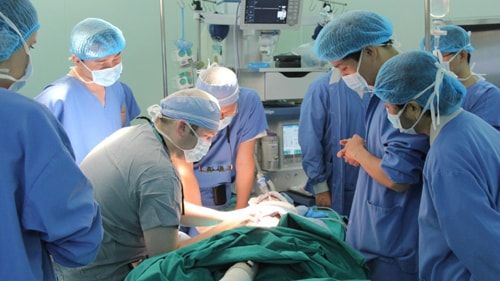For the first time, Vietnam performed surgery on a child with a rare disease.
That is baby Hoang Minh Ngoc, 4 months old in Hai Phong (the 3rd case in Vietnam with this Syndrome discovered).
For the first time, a child with the rare Apert Syndrome has been treated in Vietnam. That is Hoang Minh Ngoc, 4 months old in Hai Phong (the third case in Vietnam with this Syndrome discovered). Recently, the baby had the first surgery to separate the hands by experts from Vinmec International General Hospital. The initial surgery was successful as expected.
Surgery for children with Apert Syndrome is very complicated, requires high technology, deep expertise and has never been performed in Vietnam. Before Ngoc, there were 2 cases of this syndrome in our country that were discovered but had to go abroad for surgery many times at very high costs.
In Ngoc's case, after considering the technical, professional and medical equipment requirements, Vinmec Hospital decided to keep Ngoc in Vietnam for surgery and invited the leading US orthopedic surgeon - Dr. Simon George Talbot from Brigham and Women's Hospital, who is also a Lecturer in Surgery at Harvard Medical School, to cooperate and participate in the surgery.

Surgery
Dr. Nguyen Dac Nghia, Head of Vinmec's Orthopedic Trauma Department, said: “The surgery requires quite complicated separation techniques. We have to shape the finger cavity, protect the blood vessels and nerves; skin grafts must ensure that the fingers are soft and have good sensation so that they can function well later. In addition, due to the skull deformity, anesthesia and post-operative resuscitation are also things we are very worried about because the child is so small. During the more than 4 hours of surgery, we are not allowed to have any negligence, even the smallest one, because it can lead to respiratory failure, cardiac arrest, bleeding, infection, finger necrosis... And it can be said that the surgery was successful as expected.”
Dr. Nghia also added that this is only the surgery to separate the 2nd and 5th fingers. After 6 months, the 3rd and 4th fingers will be separated and the length of the thumb will be adjusted after 1 year. The surgery is divided into 3 times like this to ensure nutrition for the fingers, avoiding necrosis due to loss of blood supply.
However, the most challenging part of a child with Apert syndrome is skull surgery, which is usually performed when the child is 6-8 months old. Vietnam has been performing congenital cranial suture separation surgery, but it has not been performed on children with Apert syndrome because the child often has multiple malformations and many diseases, requiring the cooperation of leading doctors from many specialties such as neurology, orthopedics, etc.
Professor Nguyen Thanh Liem - Director of Vinmec International General Hospital said that Vinmec will coordinate with good domestic and international experts to perform all surgeries for Ngoc, including skull surgery. Dr. Simon George Talbot also committed to return to Vinmec to continue performing the next surgeries for Ngoc as well as other complicated pediatric surgeries if requested.
It is known that Ngoc's recent hand separation surgery was fully sponsored by Thien Tam Fund (also of Vingroup Corporation). Ngoc's mother, Ms. Dang Thu Lien, was moved to share: "I really don't know what to say other than to deeply thank the community for their concern and sharing, especially the valuable sponsorship of Thien Tam Fund and the help of Vinmec Hospital. My husband and I are just ordinary workers, unable to afford the cost of treating my child in one surgery, let alone thinking about the next surgeries. I really hope to receive more attention and sponsorship from many units, individuals or organizations so that the family can afford the costs of my child's next surgeries."
Apert syndrome is a genetic disorder that causes abnormal development of the skull. Children with Apert syndrome are born with a distorted shape of the head and face. Many children with Apert syndrome also have other birth defects. Apert syndrome is relatively rare, occurring in about 1 in 65,000 live births. Corrective surgery can help patients with Apert syndrome improve some functions and lead relatively normal lives.
Reason:
Apert syndrome is caused by a rare mutation in a single gene. This mutated gene is normally responsible for allowing bones to come together at the right time during development.
Apert syndrome is an autosomal recessive disorder, approximately two-thirds of cases are caused by a C to G mutation at position 755 in the FGFR2 gene, causing a change from Ser to TRP in the protein.
In most cases, the Apert syndrome gene mutation appears to be random. Only about one in 65,000 babies is born with Apert syndrome. Apert syndrome can be inherited from an affected adult with a 50% chance of occurring, or it can result from a spontaneous mutation.
III. Symptoms:
The defective gene in babies with Apert syndrome causes the skull bones to become compressed by the premature closure of the skull, a process called craniosynostosis. The brain continues to grow inside the abnormally small skull, putting pressure on the bones of the skull and face. The abnormal skull and facial growth in Apert syndrome causes the following major signs and symptoms:
- Pyramid-shaped skull due to premature craniosynostosis
- Sunken eyes, often with poor eyelid closure, and imbalanced eye movement muscles
- A sunken midface. Underdevelopment of the midface leads to low cheekbones and bulging eyes
Other symptoms also result from abnormal growth of the skull:
- May have intellectual disability (in most children with Apert syndrome)
- Obstruction causing sleep apnea
- Hearing loss due to ear infection, sinusitis, hearing loss.
- Syndactyly – the bones of the fingers and toes join together with the hands or feet. Some children with Apert syndrome also have heart defects, digestive problems, or urinary system problems that are not seen in other craniosynostosis syndromes.
According to (vov.vn) - M.D
